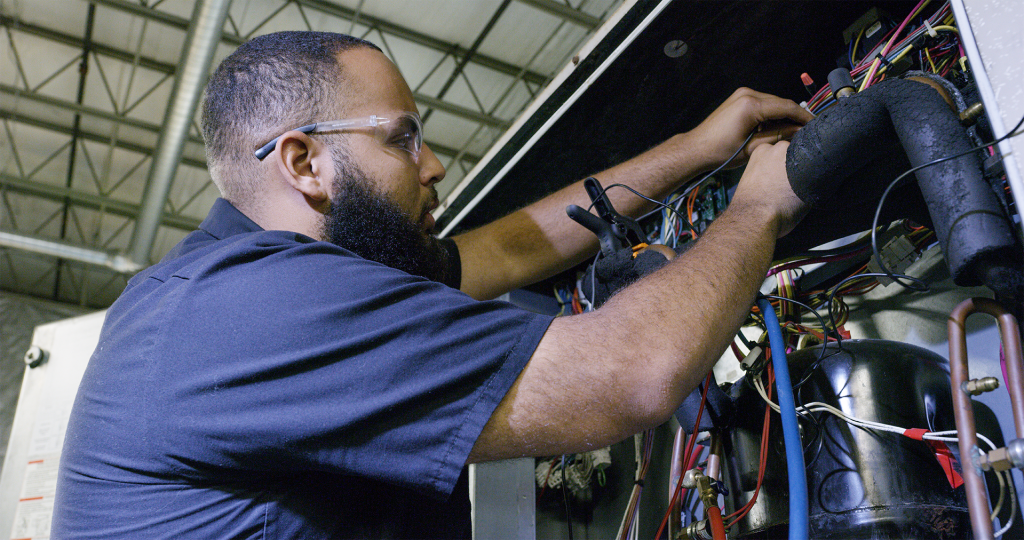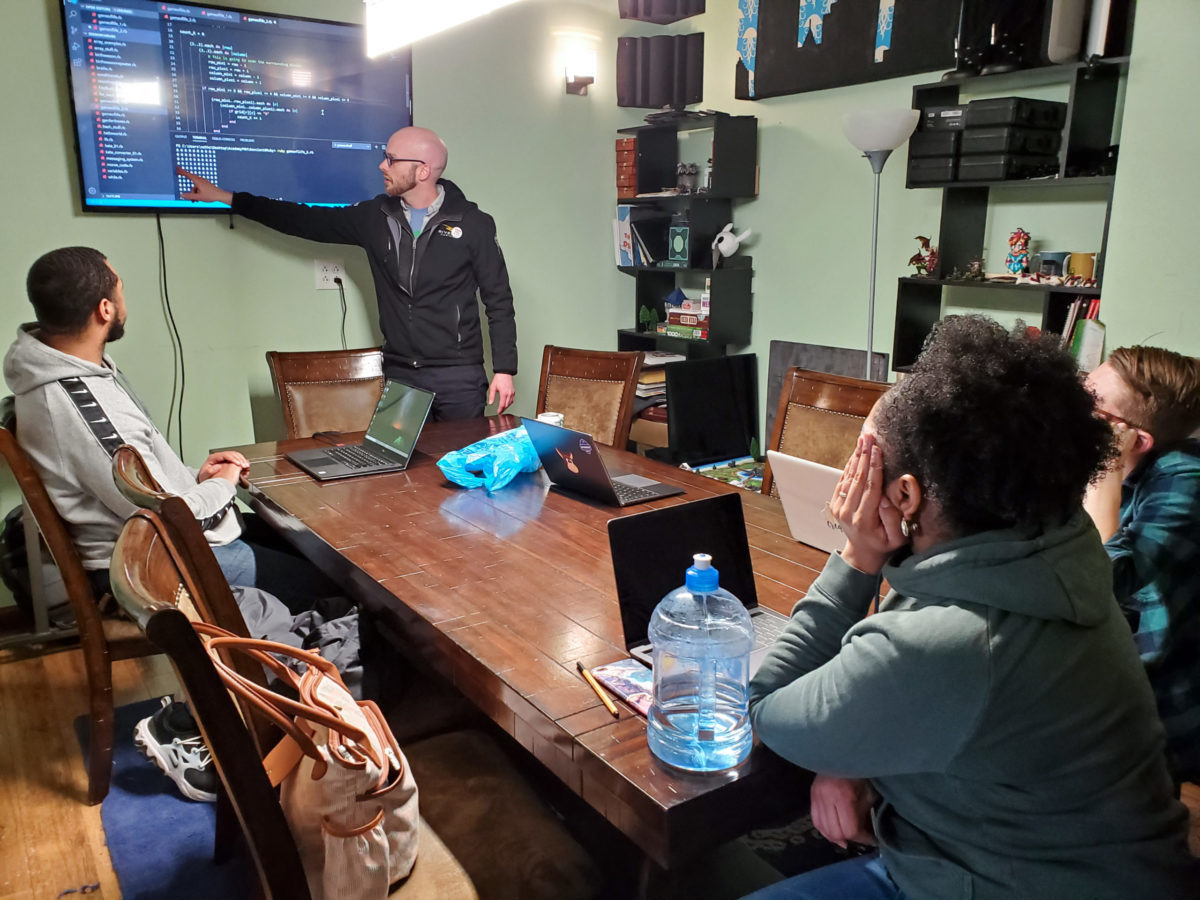Pittsburgh is a city of old and new — a growing industry of technology amidst a backdrop of steel and history of energy innovation.
Tech and energy may have little in common at first glance, but what the two lack in similarities, they make up for in pathways to employment.
The high demand for trained employees in technology and energy in Pittsburgh has transformed the way employers consider qualifications and skills training that can lead to a job. Both industries offer the opportunity for fully salaried jobs without a traditional college degree. In a city merging the old and the new, these industries are creating nontraditional routes into stable and high-paying workforces.
Pipeline to employment
“Our region has had a 200-plus-year history of innovation in energy,” explains Phil Cynar, senior communications specialist at the Allegheny Conference, Pittsburgh’s civic leadership organization. Since the early 2000s, the drilling for natural gas in the Marcellus Shale formation has made the region the largest natural gas producer in the country, and the second-largest in the world.
Employment stems from demand in the natural gas sector, as well as ancillary jobs. “Right now, we are still seeing a lot of impact from construction of physical infrastructure to get natural gas to market,” Cynar said.
According to data from the Allegheny Conference, employment in the energy sector has grown in the Pittsburgh region by 14.4% in the past decade, in coal, natural gas, and generation, specifically. For some policymakers, this growth can prove to be a double-edged sword: The movement to ban fracking for its environmental threats could potentially harm an entire workforce of stable, salaried jobs that don’t all require a four-year degree.
Part of the pipeline to employment in the energy sector comes from technical certifications and degrees, like those offered through Rosedale Technical College, located just outside the city in Kennedy Township. With a variety of skilled trades education and retraining programs ranging anywhere in length from three months to a year and a half, about 10% of Rosedale’s grads go to work directly in the energy industry, says Maria Gigliotti, the college’s student success coordinator.

These are typically graduates bringing skills such as welding, hydraulics, electronic controls, driving, and equipment repair. These skills translate to a variety of roles in the energy sector, from repairing pumps onsite to operating drilling machinery in the field. Another 15% work for companies in roles that support the energy industry such as sales and service, trucking, specialty metal and manufacturing.
The demand for these qualified workers is high, even in a time of pandemic where many of the careers are considered essential. Rosedale Tech reopened with safety plans in place early in August, welcoming one of its largest classes to date.
Post-graduation, the immediate placement rate is 88%, Gigliotti says, adding, “It’s highly possibly even more students are working, but we just don’t have the documentation.” Most graduates end up with salaried jobs, starting at $16-30 per hour, depending on skills and experience.
Many graduates end up seeking employment in Beaver County and West Virginia, says Gigliotti, and due to the nature of the work, energy jobs in the Pittsburgh area are often outside the city, creating the opportunity for stable, high-paying work in an area with less opportunity. According to data provided by the Allegheny Conference, about 71% of the workforce is white and predominantly male.
As research and industry continue to drive the demand to hire in the energy sector in Pittsburgh, the talent pipeline continues to grow, providing higher paid jobs for skilled technicians who may not have a four-year degree. In the future, “There’s quite a bit of applicable innovation going on [in renewables] here that large companies will likely be interested in,” Cynar adds.
Tech skills in demand
Pittsburgh’s demand for skilled coders and technologists is far outpacing the rate in which local universities produce them. “The demand for tech jobs is ridiculous,” says Ryan Haggerty, director of workplace development for Academy PGH, a Pittsburgh owned and operated 12-week coding bootcamp.
Pittsburgh’s growing demand for tech hires outpaces national averages, as the tech career market in the region is growing 2.5 times faster than the rest of the economy, according to TechHire PGH, a community-supported initiative to hire local tech talent. Between 2016 and 2017 alone, tech employment grew by 13.8% in the city.
“The imbalance of supply and demand has been off the charts,” echoes Justin Driscoll, campus director of Pittsburgh’s Tech Elevator location, which opened in 2018 as one of the organization’s four locations. This demand stems from both traditional, entry-level tech jobs in IT departments, as well as jobs in the healthcare, finance, energy, and manufacturing sectors.
The growing need for qualified hires has led employers to start rethinking the four-degree requirement they have for most entry-level developer positions, creating a space for state-accredited coding bootcamps, like Academy PGH and Tech Elevator, to thrive. Most firms who hire bootcamp grads are companies returning to the talent pipeline after successfully hiring a previous grad.
Tech Elevavor’s classes have included everyone from “teacher to landscapers and Uber drivers to financial planners,” says Driscoll, but the majority have between five to seven years of professional work experience; about 70% of them have bachelor’s degrees.
The experience in the workplace tends to be critical, Driscoll explains, as it can remove some of the training challenges that come with hiring a recent graduate. So far, filling the employment gap in technology with bootcamp grads is appealing to employers — Tech Elevator’s latest class of graduates from the spring has a 96% placement rate.
“Employers appreciate the fact that they’re oftentimes an adult with workplace experience,” Haggerty says. “There might be more technical onboarding, but the hires understand things like showing up on time and being able to cope with stress from their experience.”
Some Academy PGH graduates come from the service industry, are simply looking for retraining to get ahead in their field, or enter an entirely new one. On average, the program’s graduates make a $55,000 annual salary. Employers come from across the Pittsburgh area but generally concentrate in the city, including large companies like UPMC and PNC, as well as smaller startups and nonprofits.

Technical training and bootcamps both offer new opportunities, but the composition of the graduating classes are different.
While most people entering jobs in the energy sector are white and male, bootcamp graduates are oftentimes more diverse than the workforce they’re entering.
Academy PGH holds seats in every bootcamp specifically for underrepresented groups. “66% of participants from all our developer bootcamp sessions identify with a demographic group that is underrepresented in the tech workforce,” says Haggerty, which includes ALAANA (African, Latinx, Asian, Arab, and Native American), women, refugees, veterans, formerly incarcerated individuals, individuals in recovery from addiction, individuals living with a physical or mental disability, first-generation immigrants and single parents.
In Pittsburgh, demand outpacing supply for qualified hires has opened up opportunities in the workforce. Both energy and technology offer nontraditional pathways to stable salaried roles. High-paying, stable jobs in energy have historically been a part of Pittsburgh’s economy. But, the new growth in tech roles, while smaller than the region’s energy sector, continues to accelerate at a faster pace.
Though small in comparison, hiring efforts in Pittsburgh’s technology pool suggest there may be an opportunity to create a more diverse workforce, as programs like Academy PGH make an effort to train underrepresented groups that aren’t as widely present in either workforce at the moment.
As these programs grow, and qualified graduates feed into the talent pipeline, one can only imagine how qualifications considerations might change in these fields, and beyond.







